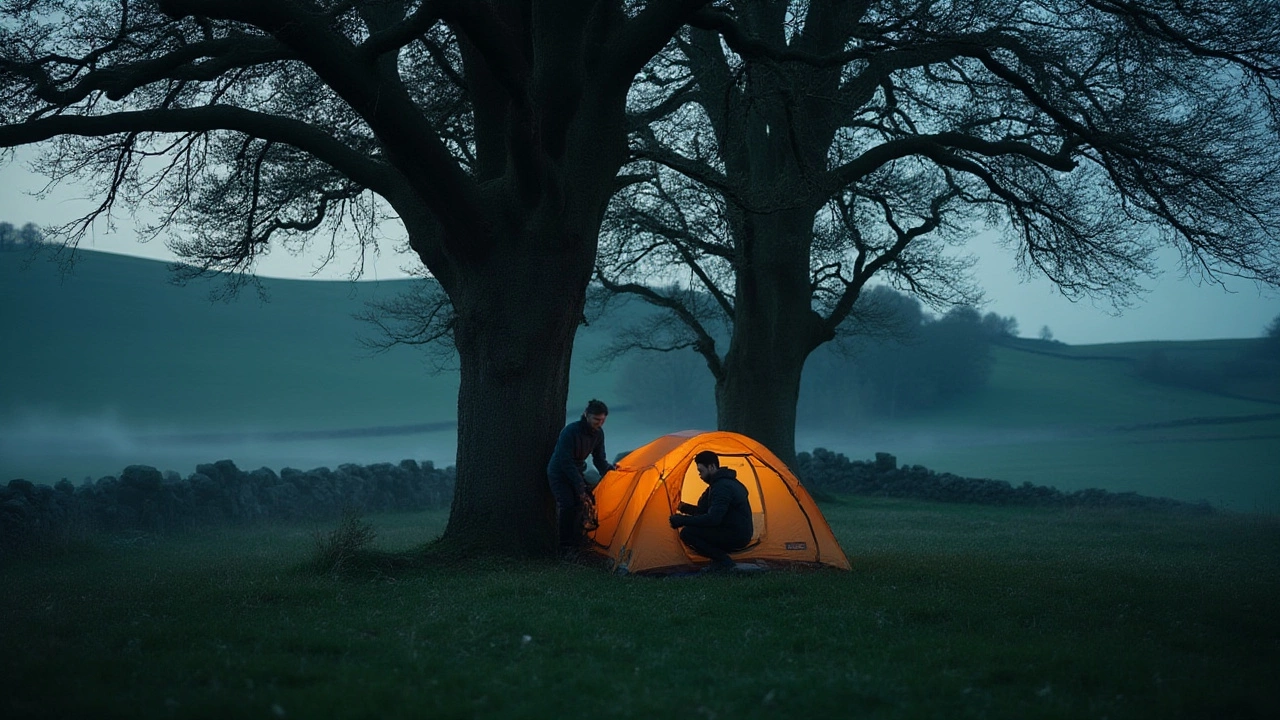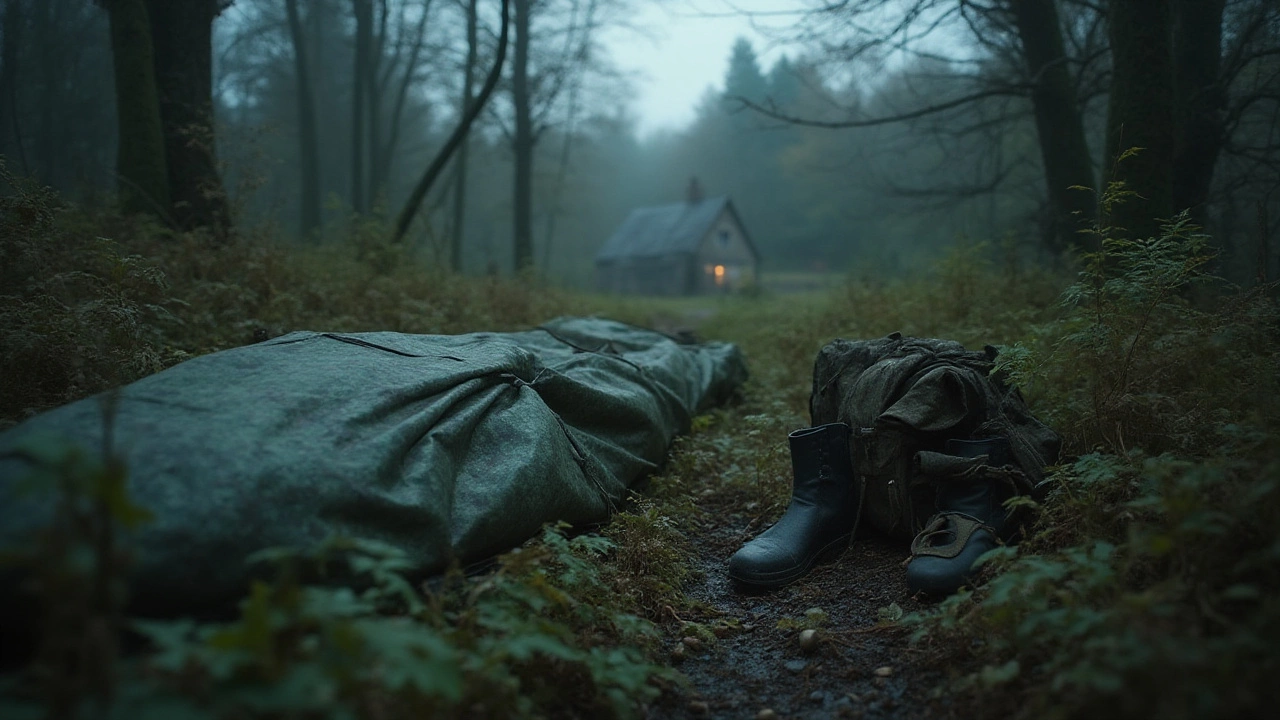Is Stealth Camping Legal in the UK? Laws, Risks, and Insider Tips
 Jul, 13 2025
Jul, 13 2025
You ever get that itch to vanish into the countryside for a night, just you, your kit, and the wide-open British sky? Stealth camping is the kind of thing you hear legends about—blokes kipping down in woods, riversides, or even roadside laybys, staying under the radar. But with all the myths floating around about folks dodging tents, is it actually legal to do stealth camping in the UK?
The Legal Lay of the Land: What Does UK Law Say About Stealth Camping?
First up, forget any romantic ideas about roaming wherever you want and pitching up under the stars. In most of England and Wales, wild camping isn’t technically legal unless you’ve got landowner permission. The Land Reform (Scotland) Act 2003 is the big outlier. Up north, you can wild camp on most unenclosed land if you respect the Outdoor Access Code, which means camp away from roads and buildings, keep things tidy, and move on without a trace.
England and Wales are stricter about land rights. Every inch of land there belongs to someone—private individuals, businesses, the council, or the National Trust. Wild camping (including stealth camping) is basically trespass. Sure, it’s a civil matter, not a criminal offense, but the landowner has the right to ask you to leave. If things get feisty or you refuse, police could get involved, especially if you refuse to leave or cause damage, and you could be prosecuted for aggravated trespass.
There are a few famous exceptions. Parts of Dartmoor, for years, allowed wild campers without asking permission, but even that’s changed. After a hotly debated court case in 2023, you now need landowner approval, though certain spots still have agreements allowing wild camping. The Lake District and Yorkshire Dales National Parks? They say no outright, but if you turn up late, camp respectfully, and go early, rangers might turn a blind eye—as long as you’re not taking the mickey.
| Region | Status of Stealth/Wild Camping | Notes |
|---|---|---|
| England | Not legal without landowner permission | Civil trespass, risk of being moved on |
| Wales | Not legal without landowner permission | Similar to England |
| Scotland | Legal with conditions | Follow Scottish Outdoor Access Code |
| Northern Ireland | Not legal without permission | Strict landowner rights |
So, is stealth camping legal in the UK? Unless you’re in Scotland and playing by their code, the answer is a solid no, unless you have the landowner's say-so. That said, it’s a bit of a grey area—nobody’s getting thrown in jail for quietly sleeping in a bivvy in the woods.
What Happens If You Get Caught: Fines, Trouble, and What Really Goes Down
You’re all tucked up in your sleeping bag, alarmed by the sound of boots crunching on gravel. What happens if you get caught stealth camping? The most common outcome is a polite (or not-so-polite) request to pack up and leave. Cops rarely get called unless there’s damage, trouble, or refusal to move. Landowners mostly don’t want a scene, just their land respected and free from rubbish. They’ve dealt with this before—some might even stop for a chat and satisfy their curiosity about your oddball camping kit.
Technically, the worst-case scenario is being done for aggravated trespass if you refuse to shift or behave badly. This ramps a civil issue up to a criminal one. On top of that, if you start fires, dump rubbish, or leave damage, you risk much bigger headaches. Fines for littering can start at £80 on the spot and rocket if you get taken to the local council.
Let’s look at what’s likely versus what’s scary. In the real world, most stealth campers in the UK report being asked to move on, with maybe a stern word or two about rights of way. Fewer than one in a hundred stealth camping stories online mention any police involvement—and those involve people being daft or blatantly disrespectful. Case studies from outdoor forums back this up: if you’re quiet, set up late, and clear out early, your odds of a drama are slim. But knackers leaving binned tents and rubbish behind? That’s what fuels tight rules and angry landowners.
Occasionally, the outcome’s positive: a local offers tea, or the ranger suggests a better spot. It’s rare, but you do hear about it—especially in the north of Scotland or in smaller villages where folks remember what sleeping under the stars means. End of the day, stealth camping isn’t a crime unless you’re rude, trash the place, or argue with the people who own the land.

Tips for Discreet Wild Nights: How to Stealth Camp in the UK Without Getting in Trouble
If you’re going to try stealth camping in Britain, you need to raise your game. Avoid the rookie mistakes: don’t camp near buildings, leave no rubbish, and never light open fires. People notice—and once they do, the game’s up. Stick to these strategies and you’ll dodge most problems:
- Arrive late, leave early: Stealth campers often show up as dusk falls and hit the road before breakfast so they’re unseen.
- Pick your spot: Stay hidden from paths and avoid areas with lots of foot traffic—think behind dense shrubs, in the lee of trees, or on higher ground.
- Go small and dark: Leave the neon tent at home. Use a low-profile bivvy or tarpaulin in muted colours.
- Keep noise to a minimum: Save the music and late-night chats for official campsites.
- Leave no trace: If you carry it in, carry it out—no exceptions. Not even orange peels or burnt matches.
- Check local guidelines: Even some National Parks publish maps with unofficial ‘okay’ zones or suggest rules like small groups or single-night stays.
- Steer clear of livestock: Fields with cows, sheep, or horses are a hard no. You’ll stress the animals—and the farmer will be less than thrilled.
- Don’t post live on social media: Wait till you leave to share that killer sunrise photo. Broadcasting your exact location can make trouble.
And if you get asked to move on, always apologise and pack up. A good attitude can save your bacon and keep wild camping stories from turning into court dates.
Changing Landscape: Future of Stealth Camping and What Adventurers Should Know Now
A lot’s changed in recent years. After pandemic lockdowns in 2020-2021, more people than ever wanted a taste of wild camping. Suddenly, that meant crowded fells, trashed woodlands, and angry headlines. The push and pull between adventure-hungry campers and landowners got more tense, and there were calls for tighter rules and bigger enforcement in hot spots like Snowdonia and the Lake District.
In 2023, the High Court ruling about Dartmoor’s wild camping rights made huge headlines. Campaigners are still fighting for more public lands to be opened up for responsible wild camping, but so far, most of England and Wales keeps things under wraps. Large landowners haven’t budged, and it’s still up to individuals to either ask permission or be low-impact and discreet.
If the UK ever opens up to Scandinavian-style right-to-roam camping, things could change fast for stealth campers. Until then, folks need to be smart—know the rules, respect the land, and keep encounters friendly. People who mess it up make it hard for everyone—so don’t be that person leaving a sleeping bag in a tree or toilet paper under a bush.
There’s no sign stealth camping will vanish, though. Brits have always liked slipping off-grid. And if you do it right, there’s a decent chance you can enjoy a night in the wild without hassle. Still, it pays to keep one eye open for shifting rules and watch for regional news—especially if you're heading off to a national park that’s had crowd trouble.
One last thing: if all this sounds like stress, loads of campsites now offer ‘almost wild’ camping—basic, no-fuss pitches where you at least don’t have to watch for torches or angry farmers. Not exactly a secret bivvy, sure, but sometimes worry-free is worth a tenner.